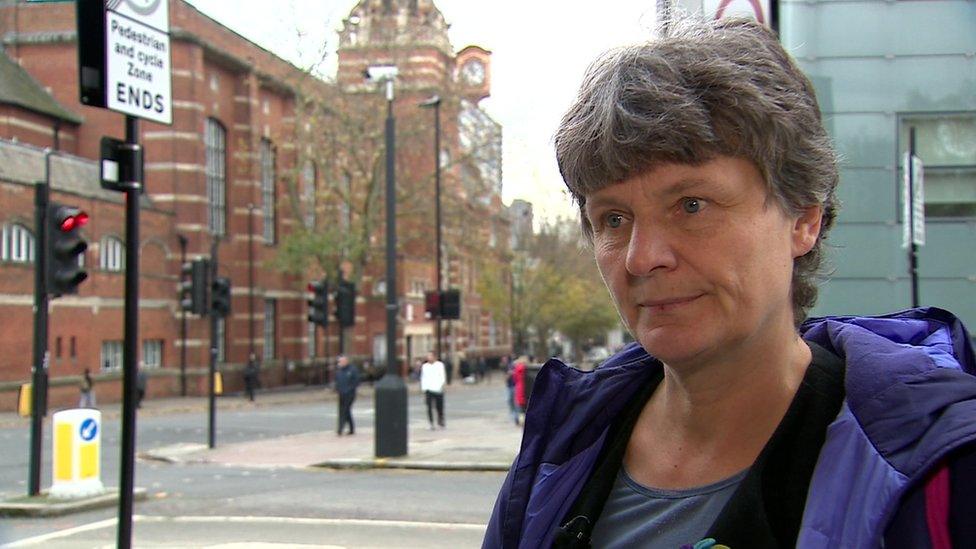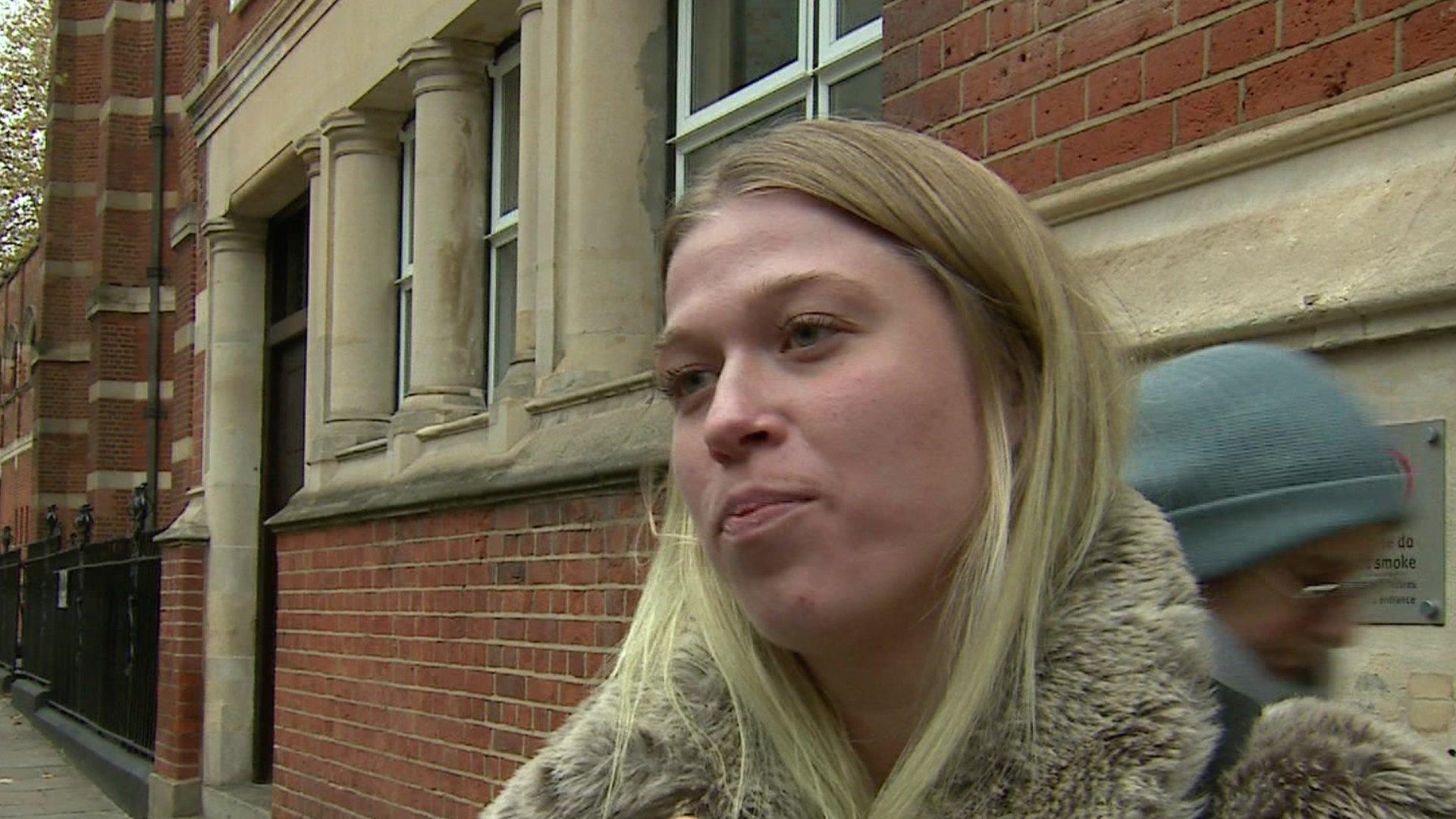University staff strike over pensions and pay
- Published

Staff at Leicester University have joined the strike
Students across the UK face disruption as lecturers and support staff in 60 universities start an eight-day strike.
Members of the University and Colleges Union (UCU) are taking action in two separate disputes, one on pensions and one on pay and conditions.
The strikes will affect almost half of all UK universities.
The universities say strikes are not the way forward and promise to do all they can to minimise the impact of industrial action on students.
In addition to striking, union members are taking other forms of industrial action, including working strictly to contract, not covering for absent colleagues and refusing to reschedule lectures lost during the strikes.
This latest action follows strikes in February and March last year, meaning some students are being affected for the second time.
Staff taking action will walk out between 25 November and 4 December and the union has not ruled out further action next term.
UCU says staff have reached "breaking point" over a number of issues, including workloads, real-terms cuts in pay, a 15% gender pay gap and changes to pensions for staff in the Universities Superannuation Scheme (USS), which the union says will leave members paying in more and receiving less in retirement.
UCU general secretary Jo Grady said about 43,600 members would be taking strike action for "systemic change".
Dr Grady said the higher education sector had "made a lot of money over the past 10 years" but that spending on staff in that period had gone down and that there had been "an attack on working conditions in the sector".
Pensions pruned?
The UCU is angry that members are now having to pay 9.6% in pension contributions, up from 8% and wants universities to pay the full increase instead.
The union estimates that, overall, changes to the pension could leave lecturers about £240,000 worse off in retirement, rising to £730,000 for professors.
Newcastle University students conflicted over strike
But the University and Colleges Employers Association and Universities UK say employers have increased their pension contributions from 18% to 21.1% of salary, paying in an extra £250m each year.
The employers say even increasing their contributions to 22.7% of salary would cost them £373m a year.
They have warned that in order to meet the union's current demands, employers "would have to divert unsustainable amounts of money from other budgets with potential consequences including for jobs, student support, course closures and larger class sizes".
For the employers, Carol Costello of Liverpool University, acknowledged the union's concerns but said recent rises both in staff pay and in employers' contributions to staff pensions were at the limit of affordability.
"It's important that the... pension scheme trustees secure the benefits for the future of the 230,000 staff in the scheme," Ms Costello told the BBC.
"They've got to meet the legal requirements that the Pensions Regulator sets out.
"We believe that what the Pensions Regulator has said is that ultimately the level of contributions that we're putting in is at the limit."
The lecturer

Dr Claire Marris is a food policy expert at City University
At London's City University, the employers' arguments do not convince staff like Dr Claire Marris.
"I'm going on strike because I really care about the education that we deliver to our students and I feel our working conditions are being eroded," Dr Marris told BBC news.
She says that although she loves her teaching and research she feels her pay and pension "which is essentially deferred pay" are being whittled away.
"By giving us less money and expecting us to do more and more work, they're making it really hard for us to deliver the quality education and the quality research which we want to do and that we want to contribute to society.
"I want parents out there who are paying the fees for their children to know that 50% of the staff in universities today are casual staff, they are on short-term contracts, they are on hourly contracts and yet that's the money they are paying those fees for and I think that money should be invested in staff."
The students

Master's student Lucy is conflicted about the strike
Lucy, a master's broadcast journalism student, is conflicted.
"I'm angry because I've paid all this money for this course... it makes it seem that this course is not important.
"Obviously I do understand why they striking... I do understand but there are different ways of going about it... I just don't think that's fair."
Grace, another trainee journalist, said losing a week out of such a short course was "really frustrating".
She believes strikes during her undergraduate course affected her final mark: "I had no dissertation tutor for six weeks... so for it to be happening again is just really annoying."
A young man in the first year of his undergraduate degree said while he supported the staff in terms of workers' rights "the timing isn't the best".
He has an assignment presentation due before the end of term but, with his seminar leader out on strike, he's not sure when or if it will take place.
"It is disturbing the rhythm of studying... it's a very pivotal time," he said.
The universities affected

The action involves members of the Universities Superannuation Scheme, external which covers staff in pre-1992 universities - those which had university status before former polytechnics became universities.
In total, the UCU says 43 universities are taking industrial action over both pensions and pay and conditions:
Aston University
Bangor University
Cardiff University
University of Durham
Heriot-Watt University
Loughborough University
Newcastle University
Open University
University of Aberdeen
University of Bath
University of Dundee
University of Leeds
University of Manchester
University of Sheffield
University of Nottingham
University of Stirling
University College London
University of Birmingham
University of Bradford
University of Bristol
University of Cambridge
University of Edinburgh
University of Exeter
University of Essex
University of Glasgow
University of Lancaster
University of Leicester
City University
Goldsmiths College
Queen Mary University of London
Royal Holloway
University of Reading
University of Southampton
University of St Andrews
Courtauld Institute of Art
University of Strathclyde
University of Wales
University of Warwick
University of York
University of Liverpool
University of Sussex
University of Ulster
Queen's University Belfast
Staff at a further 14 institutions are striking over pay and conditions only:
Bishop Grosseteste University
Bournemouth University
Edge Hill University
Glasgow Caledonian University
Glasgow School of Art
Liverpool Hope University
Liverpool Institute of Performing Arts
Queen Margaret University, Edinburgh
St Mary's University College, Belfast
Roehampton University
Sheffield Hallam University
University of Brighton
University of Kent
University of Oxford
And staff at three universities are walking out in a dispute over pensions alone:
Scottish Association of Marine Science
University of East Anglia
Institute of Development Studies